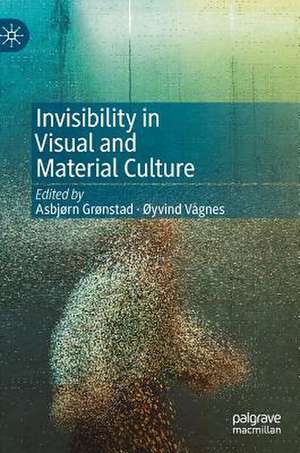Invisibility in Visual and Material Culture
Editat de Asbjørn Grønstad, Øyvind Vågnesen Limba Engleză Hardback – 14 iun 2019
| Toate formatele și edițiile | Preț | Express |
|---|---|---|
| Paperback (1) | 483.12 lei 43-57 zile | |
| Springer International Publishing – 15 aug 2020 | 483.12 lei 43-57 zile | |
| Hardback (1) | 589.14 lei 43-57 zile | |
| Springer International Publishing – 14 iun 2019 | 589.14 lei 43-57 zile |
Preț: 589.14 lei
Preț vechi: 693.12 lei
-15% Nou
Puncte Express: 884
Preț estimativ în valută:
112.77€ • 122.53$ • 94.79£
112.77€ • 122.53$ • 94.79£
Carte tipărită la comandă
Livrare economică 21 aprilie-05 mai
Preluare comenzi: 021 569.72.76
Specificații
ISBN-13: 9783030162900
ISBN-10: 3030162907
Pagini: 216
Ilustrații: XX, 232 p. 19 illus., 13 illus. in color.
Dimensiuni: 148 x 210 mm
Greutate: 0.56 kg
Ediția:1st ed. 2019
Editura: Springer International Publishing
Colecția Palgrave Macmillan
Locul publicării:Cham, Switzerland
ISBN-10: 3030162907
Pagini: 216
Ilustrații: XX, 232 p. 19 illus., 13 illus. in color.
Dimensiuni: 148 x 210 mm
Greutate: 0.56 kg
Ediția:1st ed. 2019
Editura: Springer International Publishing
Colecția Palgrave Macmillan
Locul publicării:Cham, Switzerland
Cuprins
1. Invisibility Matters, Asbjørn Grønstad and Øyvind Vågnes.- 2. Invisible Empire: Learning to Look Askew in the Art of Harun Farocki and Trevor Paglen, Henrik Gustafsson.- 3. Literary Device: Invisible Light and a Photo of Photography, Ari Laskin.- 4. Tomas van Houtryve's Packing Heat and the Culture of Surveillance, Øyvind Vågnes.- 5. Neurointerfaces, Mental Imagery and Sensory Translation in Art and Science in the Digital Age, Ksenia Fedorova.- 6. Invisibility and the Ethics of Erasure: Khaled Barakeh’s The Untitled Images, Asbjørn Grønstad.- 7. Neither Visible nor Hidden: The Structuring of the Sensible, Maria-Carolina Cambre.- 8. Reading the Invisible in Marjane Satrapi’s Embroideries, Jena Habegger-Conti.- 9. Hearing and Seeing the In/visible: Anne Charlotte Robertson’s Five Year Diary, Anjo-mari Gouws.- 10. Power in Partial Visibility: Reframing Positions on 19th& Early 20th Century Photography, Lucy L. Bowditch.- 11. Materiality of the Invisible in David Wilson’s “California Letters”, Lene Johannessen.
Notă biografică
Asbjørn Grønstad is Professor of Visual Culture in the Department of Information Science and Media Studies, University of Bergen, Norway. He is founding director of the Nomadikon Center for Visual Culture and is the author or editor of ten books, the most recent of which is the monograph Film and the Ethical Imagination (Palgrave, 2016).
Øyvind Vågnes is Professor in the Department of Information Science and Media Studies at the University of Bergen, Norway. He is a journal editor for the Journal of Visual Culture and his monograph Zaprudered: The Kennedy Assassination Film in Visual Culture (2011) received an honourable mention at the American Publishers Awards for Professional and Scholarly Excellence in 2012.
Øyvind Vågnes is Professor in the Department of Information Science and Media Studies at the University of Bergen, Norway. He is a journal editor for the Journal of Visual Culture and his monograph Zaprudered: The Kennedy Assassination Film in Visual Culture (2011) received an honourable mention at the American Publishers Awards for Professional and Scholarly Excellence in 2012.
Textul de pe ultima copertă
The essays in Invisibility in Visual and Material Culture contribute pioneering and revelatory insights into the phenomenon of invisibility, forging new and multi-disciplinary approaches at the intersection of aesthetics, technology, representation and politics. Importantly, they acknowledge the complex interaction between invisibility and its opposite, visibility, arguing that the one cannot be fully grasped without the other. Considering these entanglements across different media forms, the chapters reveal that the invisible affects many cultural domains, from digital communication and operative images to the activism of social movements, as well as to identity, race, gender and class issues. Whether the subject is comic books, photographic provocations, biometric and brainwave sensing technologies, letters, or a cinematic diary, the analyses in this book engage critically and theoretically with the topic of invisibility and thus represent the first scholarly study to identifyits importance for the field of visual culture.
Caracteristici
Constitutes the first book-length study on the subject of invisibility Provides a strongly interdisciplinary investigation, involving contributions from art history, media studies, literature, cultural studies, and philosophy Explores the complex intersections between technology, representation, aesthetics, identity, and politics
